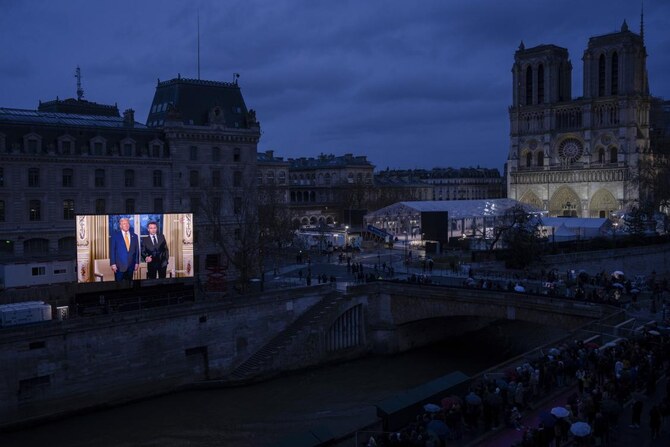PARIS: French President Emmanuel Macron welcomed guests set to include Donald Trump on Saturday at Paris’ Notre-Dame Cathedral for its reopening ceremony, five-and-a-half years after a huge fire brought the Gothic masterpiece close to collapse.
The 860-year-old medieval building has been meticulously restored, with a new spire and rib vaulting, its flying buttresses and carved stone gargoyles returned to their past glory and white stone and gold decorations shining brightly once again.
Getting US President-elect Trump to attend, and organizing a meeting between him and Ukraine’s leader Volodymyr Zelensky at the Elysee Palace ahead of the Notre-Dame ceremony was a coup for Macron as he faces a political crisis at home, after parliament ousted his prime minister.
Zelensky joined Britain’s Prince William, Italian Prime Minister Giorgia Meloni and former French presidents Francois Hollande and Nicolas Sarkozy, who were arriving for the evening ceremony.
Tech billionaire Elon Musk, a close adviser in Trump’s transition team, was also set to attend, a French government source said.
Earlier, tourists, who still cannot go inside the cathedral, snapped pictures with the restored building in the background as final preparations for the event went on inside.
“It was very sad to see it burnt down and all black and ashy but amazing to see it rebuilt. Yeah, it’s very special,” said 26-year-old US tourist Amanda Nguyen, from Texas.
Some Parisians were particularly thrilled.
“What does Notre-Dame mean to me? This. Look, it’s here,” said careworker Pascal Tordeux, displaying a tattoo on his arm representing the cathedral. “It means everything.”
“I saw the construction every day from my window, the spire being brought down, being brought back. I saw it burn, I saw it rise again. I followed it day by day,” said Tordeux, who lives across the river from Notre-Dame.
On the evening of April 15, 2019, dismayed Parisians rushed to the scene and TV viewers worldwide watched horrified as the fire raged through the cathedral.
“The planet was shaken on that day,” Macron said ahead of Saturday’s event. “The shock of the reopening will – I believe and I want to believe – be as strong as that of the fire, but it will be a shock of hope.”
THOUSANDS WORKED ON RESTORATION
Forecast strong winds mean the non-religious part of the celebrations, including Macron’s speech, which had been set to be held outside the cathedral, will also be held inside.
Would-be visitors can now book a free ticket online, on the Cathedral’s website. But on Saturday, the first day bookings could be made for the coming days, all tickets were gone, a message on the site said.
Group visits will be allowed next year — from Feb. 1 for religious groups or from June 9 for tourists with guides. The Catholic Church expects the cathedral to welcome 15 million visitors each year.
Thousands of experts — from carpenters and stonemasons to stained glass window artists — worked around the clock for the last five years, using age-old methods to restore, repair or replace everything that was destroyed or damaged.
“Notre-Dame is more than a Parisian or French monument. It’s also a universal monument,” said historian Damien Berne.
“It’s a landmark, an emblem, a point of reference that reassures in a globalized world where everything evolves permanently,” said Berne, a member of the scientific council for the restoration.
The cathedral’s first stone was laid in 1163, and construction continued for much of the next century, with major restoration and additions made in the 17th and 18th centuries.
Victor Hugo helped make the cathedral a symbol of Paris and France when he used it as a setting for his 1831 novel “The Hunchback of Notre-Dame.” Quasimodo, the main character, has been portrayed in Hollywood movies, an animated Disney adaptation and in musicals.
So much money poured in for the renovation from all over the world — more than 840 million euros ($880 million), according to Macron’s office — there are still funds left over for further investment in the building.
Restored Notre-Dame Cathedral reopens, five years after fire
https://arab.news/968y4
Restored Notre-Dame Cathedral reopens, five years after fire

- The 860-year-old medieval building has been meticulously restored, with a new spire and rib vaulting
- Tourists, who still cannot go inside the cathedral, snapped pictures with the restored building in the background as final preparations for the event went on inside






























